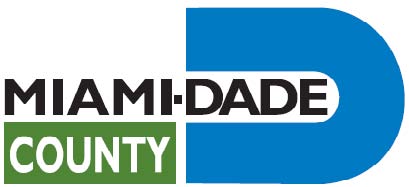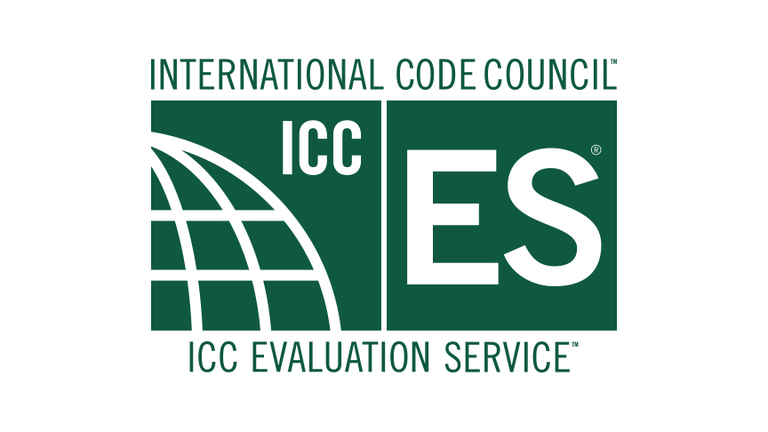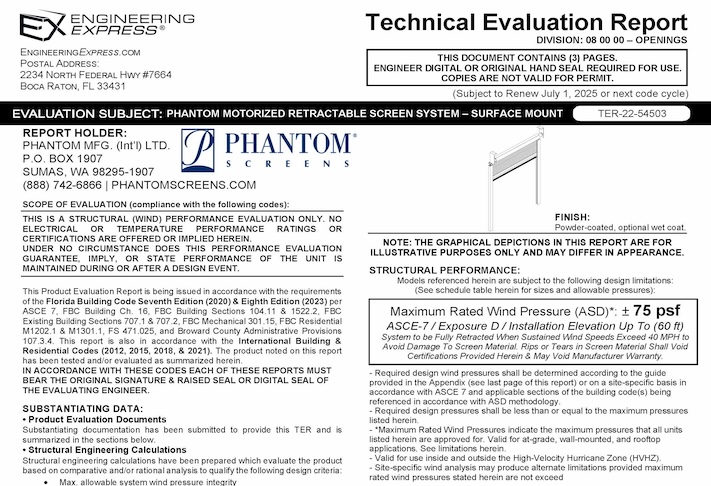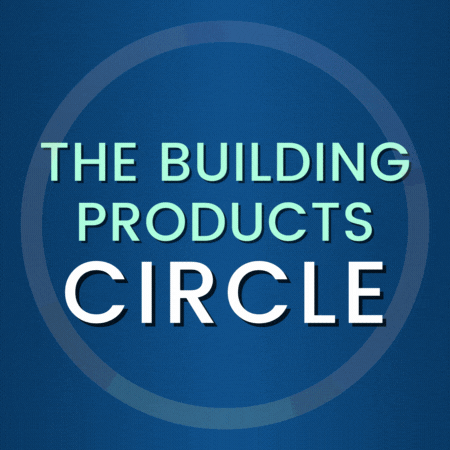Here Are 3 Myths About Product Approval Requirements
Background
Product evaluations (sometimes called “product approvals”, “ICC reports”, Miami Dade NOA’s or similar) for building products are general requirements as found in the International Building Code.
Building officials, architects, insurance companies, third-party reviewers, and even homeowners ask for them all the time.
Permits frequently require them, insurance discounts are provided with them, and they are needed for building product installations.
So what is the ruling on when and if product approvals are required for a particular building product?
Myth #1: “You need to have a Florida Product Approval” (Florida Statewide Evaluation)
In Florida, the building code requires only certain products be tested and evaluated by an engineer, architect or approved test agency.
Many states outside Florida accept Florida Approvals but typically require codes changed and proper state certification, turning Florida Approvals into general engineer evaluation reports.
The Florida building product evaluations or certified test documents can either be registered with the state of Florida through their statewide product approval system website or by use of a ‘Local Product Approval‘.
There are only some building product types that require state or local approval per the Florida statutes, and only for products protecting a habitable structure (click here for Florida’s presentation):
| 1. Panel Walls | 2. Windows |
| 3. Exterior Doors | 4. Shutters |
| 5. Roofing Products | 6. Structural components |
| 7 Skylights | 8. New Technologies |
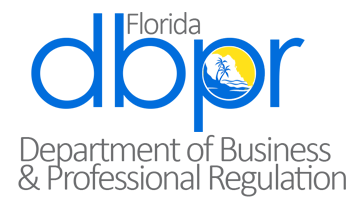
Ref: Florida Administrative Code FAC 61G20-3.001
NOTE: See more about these required sections and the codes that created them by clicking here for our in-depth article.
Engineers can evaluate a product in Florida without a state certification if the local approval method is followed. It’s just easier to have an FL number, not mandatory. Texas TDI has a similar voluntary product evaluation system as well.
Florida's FAQs Also Help
Find FAQ’s about Florida Product Approvals on the MyFlorida.com Product Approval Help Page
Myth #2: “You need to have an NOA for your product or system”
Miami Dade NOA’s (meaning Notices of Acceptance), contrary to popular understanding, are in themselves NOT approved as a statewide product approval. Miami NOA’s permit applications for more evaluation categories than Florida’s system, but still don’t encompass every product type. NOA’s are adopted either by registering them with the state system (if they are applicable to the above product types) or by the Local Product Approval process (see FS 553.8425).
Other evaluations (such as engineer Technical Evaluation Reports or TER’s) are permitted by code (see FBC 1604.4) through the authority provided to a registered professional engineer or architect by a ‘rational analysis’ or through the local approval process. Learn more from the Miami Dade Website by clicking here for their requirement forms.
…IT’S JUST BEEN A LONGSTANDING MYTH THAT AN “NOA” IS REQUIRED FOR ALL PRODUCTS…
Myth #3: “You need an ICC report” (ICC-ES International Code Council Evaluation Reports)
From the ICC website, an ICC-ES report is a document that presents findings, conclusions, and recommendations from a particular evaluation. From their website, ICC tests and certifiesHaving an product ICC evaluated is great certification to have for your building product. It’s just not required, and not available for all product types.
There are also other approved evaluation entities that perform a similar type of evaluation, UL, IAPMO, and Intertek, among others. The main difference between an ICC report and a code-compliant engineering evaluation other than the trust in peer-review is ICC and similar reports come from accredited bodies (such as ANSI) and do not have to be signed and sealed.
Engineer evaluations meet many of the same code requirements but must be individually and originally signed and certified by the design professional. ICC evaluations don’t fit for every product, budget, or timeline. Engineering Express offers an alternative solution while still assisting with ICC-ES, Miami Dade, Florida, and Texas TDI submissions of products when needed.
| > Fasteners | > Door/Windows | > Wall Systems |
| > Concrete Anchors | > Cladding | > Flooring/Deck Systems |
| > Manufactured Wood | > Wall Covering | > Metals & Masonry |
| > Plastic Lumber | > Roof Materials | > Other Similar Components |
So, is a product approval required for building products?
A general building product that is not intended to protect habitable spaces or the building envelope from flying debris, cyclical loads, or storms in any way does not require a product approval in Florida.
Generally, a building product that is part of a building envelope
does need some sort of product testing & approval for use.
Building products not part of primary living space are structural components, decorative, or accessories around a building.
Once limiting conditions are evaluated by an engineer, general building products need only comply with requirements that the load upon the component is not exceeded when used upon a particular structure and that the components do not become ‘flying debris’ or cause potential injury during a storm.
In Florida, a product approval is not required when a building product is installed in a non-habitable application.
Since an engineer must ensure products exposed to high wind or lateral forces do not become unsafe structures or contribute to wind-borne debris, the evaluation report combined with an engineer’s evaluation of the structure where the component is used serves as a safe rating of the product installed to the rated threshold to meet this obligation.
Why Engineering Express provides Technical Evaluation Reports (TERs) & Product Evaluations
Along with testing (and sometimes without), an engineering ‘rational analysis’ can be performed on any product not required to meet the requirements for protection of the building envelope to demonstrate compliance.
When testing is part of the evaluation, the evaluation must consider multiple specimens, structural limitations of use, the method of testing, and quality control.
When testing is not required, that evaluation must consider all failure modes and their respective required factors of safety when determining a rated safe load limit.
The rating on any Engineering Express Technical Evaluation Report provided by this office is the safe load limit the component can withstand during a design event and clearly stated on the document.
Click here to see our list of publicly available TER’s (all requiring an original signature and seal to be valid per code).
Click here to learn more about general performance evaluations.
How are product evaluation reports approved?
From the International/Florida Building Code 2012/2015/2018/2021 & Florida 2017/2020/2023 Section 104.11 Alternative materials, design, and methods of construction and equipment:
The provisions of this code are not intended to prevent the installation of any material or to prohibit any design or method of construction not specifically prescribed by this code, provided that any such alternative has been approved. An alternative material, design or method of construction shall be approved where the building official finds that the proposed design is satisfactory and complies with the intent of the provisions of this code, and that the material, method or work offered is, for the purpose intended, not less than the equivalent of that prescribed in this code in quality, strength, effectiveness, fire resistance, durability and safety. Where the alternative material, design or method of construction is not approved, the building official shall respond in writing, stating the reasons why the alternative was not approved.
104.11.1 Research reports. Supporting data, where necessary to assist in the approval of materials or assemblies not specifically provided for in this code, shall consist of valid research reports from approved sources.
These building codes define APPROVED SOURCE (Section 202) as: “An independent person, firm or corporation, approved by the building official, who is competent and experienced in the application of engineering principles to materials, methods or systems analyses.” Engineering Express® professionals meet the competency requirements as defined in the code and can seal their work. Engineering Express® is regularly engaged in conducting and providing engineering evaluations of single-element and full-scale building systems.
Engineering Express provides hundreds of TER's and Performance Evaluations in our Online Plan Store. We typically design these for the manufacturers so their installers can quickly and easily obtain sealed copies to obtain certified copies for their building permit.
Contact your local building official BEFORE ordering any engineering to determine what exactly is needed for permit. We can assist in providing documentation to building officials to substantiate our reports.
Manufacturers: Contact Us to discuss your need for your product’s TER.
Broward County, FL Product Approval Resources Page
Find FAQ’s about Florida Product Approvals on the Broward County Product Approval Resource Page
More help for building products product approvals
Search ALL Product Approvals Using
Product Approvals Are Not Always Required – Here’s Why
When is a Miami-Dade Product Approval Required?
What is a Master Plan Sheet / Product Performance Evaluation?
How do I Quickly Get a Certified TER or Master Plan?
Can a Plan Reviewer or Building Inspector Deny The Use of a TER or Master Plan?
What do I do if a TER isn’t enough for a permit?
Watch Our Educational Videos
When Product Approval is Not Required
When Product Approval Is Required
Last Update: June 25, 2025
Related Knowledge Base Posts -
- Should a professional utilize the ASD (Allowable Stress Design) method or the LRFD (Load Resistance Factored Design) method when calculating the required wind pressure for use with tested-approved systems?
- Did the wind loading requirements change for rooftop structures for ASCE 7-22 – ASCE 7-16 & The Florida Building Code?
- What wind speed should I use for my project?
- ASCE 7 WIND EXPOSURE CATEGORIES AND HOW EXPOSURE ‘D’ WORKS
- What are the requirements for using ASTM Missile Level E in Florida and the US?
- About ASTM E1996 Missile Levels
